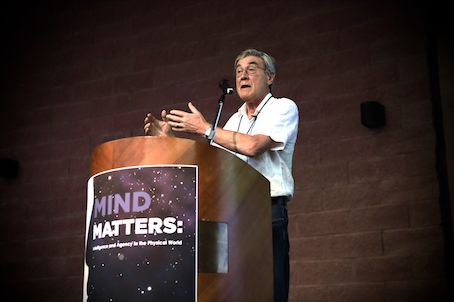
Paul Davies
Earlier this month, astronomers announced the discovery of water in the atmosphere of a potentially habitable planet, some 111 light years or 650 million million miles from Earth. The planet, called K2-18b, is reported to be a plausible candidate for hosting alien life.
What will those searching for signs of life be looking for? The plan is usually to watch for gases in the atmosphere of planets and moons that could only have been produced by living organisms, although in this case, because K2-18b is so far away, it will take the next generation of space telescopes to pick out such evidence. That covers life that we are familiar with, but what if these distant worlds harbour 'life, but not as we know it'? What will scientists look for then?
As Paul Davies, a physicist and FQXi member at Arizona State University noted at FQXi's 6th International Meeting in Tuscany, in July, astrobiologists don't have a "life-meter" that can detect life in any form it may take because scientists don't yet have a clear definition of what constitutes life in the first place.
In his talk, which you can now watch on FQXi's YouTube channel, Davies describes his quest for a definition of life in terms of information. Embryo development marks a "meticulous choreography of organised information, all the right bits end up in the right place at the right time," says Davies. "A wonderful example of the power of information to sculpt physical forms, living forms."
In particular, Davies is searching for a boundary that an entity crosses in its ability to process information -- a "demonic cut" -- enabling it to manipulate and exploit information in a controlled way. Does this ability mark the transition from being a non-living to a living thing? (The term 'demonic' here is a reference to Scottish physicist James Clerk Maxwell's hypothetical demon, which can seemingly violate the laws of thermodynamics to produce useful work based on its knowledge about a system.)
An intriguing question that came up a few times at the meeting is whether big questions about the origin of life, consciousness, intelligence and agency, can be explained by known physics. A few weeks ago, I posted an edition of the podcast featuring Carlo Rovelli's work to understand decision-making by better investigating aspects of psychology, physics, cosmology, biology and information theory. Rovelli acknowledges there are many open questions, but he believes they can eventually be answered with today's science.
Davies, however, takes the opposite view. He's not calling for a supernatural explanation for these features, but in recent years, as he describes in the video, he has started to think that we need a new kind of physics to get to the bottom of these deep issues about our origins -- a new kind of physical law. With FQXi member Sara Walker, he is investigating so-called "state-dependent laws of information." You can think of these shifting laws like the rules of chess changing mid-game depending on the configuration of the chess pieces at different points.
[youtube:3SnJdp-hzrY, 560, 315]
So, do you agree with Davies that these questions will need new physics? Or, like Rovelli, do you think that we simply need to better understand the science we already know? Or would you say that, perhaps, these puzzles lie beyond the scope of science?